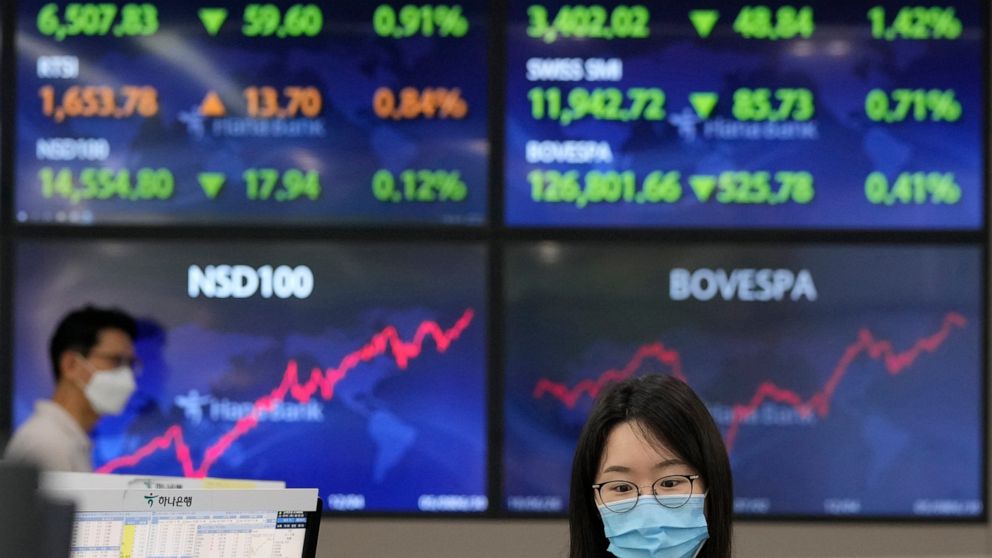World shares mixed as investors watch for US jobs report
TOKYO — Asian shares were mostly lower on Thursday as investors awaited a much watched U.S. jobs report for indications of how the recovery from the pandemic is faring.
Japan’s benchmark Nikkei 225 slipped 0.4% to 28,707.04, while South Korea’s Kospi lost 0.5% to 3,281.79. Australia’s S&P/ASX 200 shed 0.5% to 7,274.00. The Shanghai Composite gained 0.3% to 3,600.64. Trading was closed in Hong Kong for the anniversary of the handover of the former British colony to Beijing.
The Bank of Japan’s quarterly “tankan” survey showed continuous recovery, with large manufacturers’ sentiment remaining largely positive despite the pandemic.
The headline survey showed a rise to 14 from 5 in the previous quarter, but that was lower than expected, according to Robert Carnell, regional head of research Asia-Pacific at ING.
The tankan measures corporate sentiment by subtracting the number of companies saying business conditions are negative from those responding they are positive.
Carnell and others said the tankan findings show the big jump in recovery for the world’s third largest economy may already be over, meaning that from now, the rebound will be steady but gradual.
“Risks factors such as the more contagious delta strain of COVID-19 and U.S. payrolls report will continue to be on watch,” said Yeap Jun Rong, market strategist at IG in Singapore.
“Although there has been optimism on the vaccine front to curb the delta variant, the vaccination progress in the region will have to see some significant pick-up to deal with the spreads,” Yeap said.
Worries remain as Asia has lagged the U.S. and parts of Europe in vaccinations and some countries are enduring their worst outbreaks yet.
On Wall Street, the S&P 500 edged up 0.1%, bringing its advance over the past three months to 8.2% and 14.4% for the first half of the year.
Stocks have been pushing higher on optimism that the economy is strengthening and that the Federal Reserve will keep interest rates low for a while longer.
Investors are waiting for the government’s monthly jobs report due out Friday.
The S&P 500 index rose 5.70 points to 4,297.50. The Dow Jones Industrial Average added 0.6% to 34,502.51. The Nasdaq composite fell 0.2% to 14,503.95. The tech-heavy index hit record highs on Monday and Tuesday.
The Russell 2000 index of small company stocks rose 0.1% to 2,310.55.
Industrial, financial and energy companies were among the winners Wednesday. Those gains were kept in check by a pullback in technology, communication and real estate stocks.
Many professional investors along Wall Street say stocks can keep rising from here, just not as much as they did during the first half of the year.
Interest rates remain low, even if the Federal Reserve recently indicated it could start raising rates in about two years. And with the economy continuing to strengthen, supporters say stocks should be able to tick higher even if their prices have climbed faster than corporate profits and look expensive compared with history.
Some are more pessimistic, though, amid concerns that several measures of growth in the economy have already hit their peak.
Barry Bannister, chief equity strategist at Stifel, says U.S. manufacturing growth likely topped out in March, for example. He sees the recent pullback of stimulus in China leading to slower growth around the world and helping to knock the S&P 500 down to 3,800 in the second half of the year.
So far this year, energy stocks continue to lead the way higher among the 11 sectors in the S&P 500 with a gain of 42.4%. Financials are the next-biggest gainer, up 24.5%, while real estate companies are up 21.7%. Technology companies, the biggest gainers in 2020, are up 13.2%. Utilities lag the rest of the market through the first half of this year with a gain of 0.8%.
As inflation concerns have receded through much of the quarter, that’s helped push solid gains for technology companies. Tech stocks have been the biggest gainers in the S&P 500 this quarter with a 12.9% rise. The sector is viewed as a high-growth area of the market, which tends to do better when inflation is low.
In energy trading, benchmark U.S. crude rose 12 cents to $73.59 a barrel in electronic trading on the New York Mercantile Exchange. It gained 49 cents to $73.47 on Wednesday. Brent crude, the international standard, gained 8 cents to $74.70 a barrel.
In currency trading, the U.S. dollar inched up to 111.14 Japanese yen from 111.11 yen. The euro cost $1.1843, down from $1.1855.
![]()


